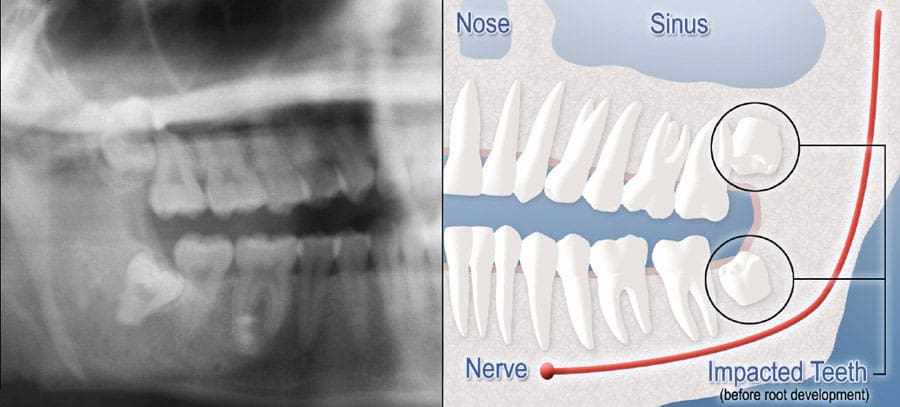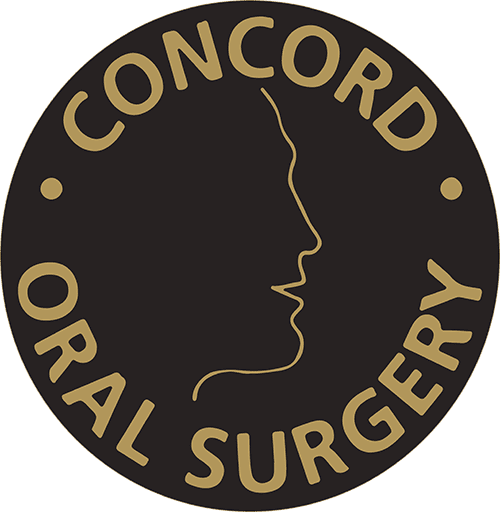Wisdom teeth, also known as third molars, are the last set of adult teeth to come in. They typically appear between the ages of 17 and 25.
Some people have all four, while others only have 2 or none at all!
These teeth were beneficial to our ancestors, who relied on them for grinding tough foods. However, with modern advancements in diet and oral hygiene, they are unnecessary and can cause more harm than good.
If there isn’t enough room for them to erupt properly, they can become impacted and cause pain, infection, and damage to the adjacent teeth.
Key Takeaway
Wisdom teeth are the last molars to erupt. They usually appear between the ages of 17 and 25. If there isn’t enough room for them to come in properly, it can cause pain, infection, and damage to adjacent teeth. To avoid potential issues, wisdom teeth may need to be removed by an oral surgeon.
Why Do Wisdom Teeth Need To Be Removed?
There are a few reasons why wisdom teeth may need to be removed:
- Lack of space: As mentioned, wisdom teeth often do not have enough room to fully emerge. This can cause them to grow in at an angle or only partially come through the gum line, leading to potential problems.
- Impacted teeth: When there isn’t enough space for the tooth to erupt, it can become impacted (stuck) under the gums. This can lead to pain, infection, and possible damage to nearby teeth.
- Crowding: Wisdom teeth that do manage to come in can also cause crowding in the mouth. This can disrupt the alignment of other teeth and affect your bite.
- Difficulty cleaning: Wisdom teeth are located at the back of the mouth, making them difficult to clean properly. This can increase the risk of tooth decay and gum disease.
- Cysts or tumors: In rare cases, cysts or tumors may form around impacted wisdom teeth, causing damage to the jawbone and nearby teeth.
Signs Your Wisdom Teeth Need To Be Removed
Not all problems related to wisdom teeth are visible or noticeable.
The only way to be sure is to have them evaluated by an oral surgeon.
When you come in for an exam, we will perform an oral exam and take panoramic x-rays of the mouth. This will allow Dr. Barron to evaluate the position of the teeth and predict if they will cause any problems in the future.
Your family dentist will keep an eye on your wisdom teeth during regular check-ups. They will generally recommend an evaluation by an oral surgeon if you are considering orthodontic treatment or have started to experience any of the following:
- Pain or discomfort in the back of your mouth
- Swelling or redness in the gum tissue around the wisdom teeth
- Difficulty opening your mouth or chewing
- Persistent bad breath or bad taste in the mouth
Impacted Wisdom Teeth
One of the biggest problems with wisdom teeth is that they can become impacted. There are three different types of impaction:
- Soft tissue impaction: This occurs when the tooth has partially come through the gum line but is still covered by tissue.
- Partial bony impaction: In this case, the wisdom tooth has started to come in at an angle but hasn’t fully emerged from the jawbone.
- Complete bony impaction: This is when the wisdom tooth is completely encased in the jawbone and unable to erupt.
If left untreated, impacted wisdom teeth can lead to infection, damage to adjacent teeth, and even cysts or tumors.
Impaction isn’t the only concern with wisdom teeth. Third molars that have emerged through the tissue in a normal, upright position can still cause problems. These teeth are difficult to clean, which can lead to tooth decay and gum disease.

Wisdom Teeth Removal Procedure
If it is determined that your wisdom teeth need to be removed, Dr. Barron will discuss the best course of action with you and answer any questions you may have.
Preparing For Surgery
On the morning or afternoon of your surgery, it is important to follow the instructions provided by our office. You will be asked not to eat or drink anything for at least six hours before your surgery and to wear comfortable, loose-fitting clothing.
You should arrange for someone to drive you home after the procedure as you may still feel drowsy from the anesthesia. You will not be allowed to leave the office without a companion or someone to drive you home.
You will not be able to eat solid foods for a few days following the surgery, so make sure to stock up on soft foods and liquids beforehand.
Download this PDF for a list of soft food ideas.
Sedation Options
We understand that many people may feel anxious or nervous about wisdom tooth removal. That’s why we offer anesthesia options to help you relax during the procedure:
- Nitrous oxide (laughing gas): This is a mild sedative that is inhaled through a mask and helps you relax during the procedure. It also wears off quickly, so you can resume normal activities afterward.
- IV sedation: This is administered directly into the bloodstream and provides a deeper level of sedation. You will be closely monitored during the procedure and will need someone to drive you home afterward.
- General anesthesia: This involves being completely unconscious during the procedure and is typically reserved for more complex cases. General anesthesia is administered in our office by an anesthetist and you are monitored closely throughout the procedure.
Speak to Dr. Barron about which anesthesia option may be best for you.
Procedure Details
The procedure takes approximately 30 to 60 minutes, but you will be in the office for about 90 minutes.
The surgery is generally performed in this order:
- Local anesthesia is administered to numb the area where the wisdom teeth will be removed.
- If the tooth is impacted, an incision will be made in the gum tissue to access the tooth.
- The tooth may need to be sectioned and removed in smaller pieces if it is difficult to extract.
- If the tooth is exposed, it will be gently rocked back and forth to loosen it from the jawbone.
- Once the tooth is removed, any remaining debris or bone fragments will be cleaned out.
- The incision in the gum tissue will be closed with dissolvable stitches.
After the procedure, you will be given gauze to bite down on for about 30 minutes to control bleeding.
What to Expect After Surgery
Once the local anesthesia wears off, you may experience some discomfort and swelling.
A detailed list of post-op instructions will be provided to you before your surgery. Familiarize yourself with these instructions so that you can be prepared on the day of surgery.
Here are a few key points to keep in mind:
- Take prescribed medication as directed.
- Prioritize rest on the day of surgery.
- Apply ice packs to your cheeks for the first 48 hours to reduce swelling.
- Do not drink through a straw, smoke, vape, or drink alcohol for the first week after surgery.
- Do not rinse your mouth for 24 hours and avoid spitting as it can dislodge blood clots and cause bleeding.
- After 24 hours, you can gently rinse your mouth with warm salt water after meals.
- Watch for signs of infection
Within a few days, you should start to feel better and be able to resume normal activities. However, it is important to follow all post-op instructions carefully to ensure proper healing and minimize any potential complications.
Did You know?
Smoking increases the risk of infection. The chemicals in cigarettes and vape pens can delay healing and increase the chances of complications after wisdom tooth removal.
Wisdom Tooth Extraction After Care
Platelet-Rich Fibrin For Optimal Healing and Recovery
We offer platelet rich fibrin (PRF) as an additional option to promote faster and more efficient healing after wisdom teeth removal.
These are natural growth factors that are collected from your blood and applied directly to the surgical site, stimulating the body’s regenerative processes.
Speak to Dr. Barron about these options during your consultation.
Risks and Complications
Like any surgical procedure, there are potential risks and complications associated with wisdom teeth removal. These may include:
- Dry socket, a painful condition that can occur when the blood clot in the extraction site dislodges
- Excessive bleeding or swelling
- Nerve damage that can result in numbness of the lips, tongue, or chin
- Sinus perforation if the upper wisdom teeth roots are close to the sinuses
It is important to follow post-operative instructions and report any unusual symptoms or concerns to your oral surgeon. In most cases, these complications can be effectively managed and resolved.
Choose Concord Oral Surgery For Wisdom Tooth Removal in Vaughan, ON
We understand that the thought of wisdom teeth removal can be daunting. That’s why we are committed to providing you with a comfortable and safe experience.
Dr. Barron, DMD, is an experienced and highly skilled oral surgeon who will work closely with you to ensure the best course of treatment for your unique situation.
If you have questions or concerns about your wisdom teeth, do not hesitate to contact us and schedule a consultation. To book an appointment at our oral surgery office in Vaughan, call (905) 669-2616 or complete the appointment request form.
Check out our Google Reviews and see what our patients have to say about the treatment they received at our oral surgery office in Vaughan, ON.
FAQs About Wisdom Teeth Removal
What are the do’s and don’ts after wisdom teeth removal?
– DO take prescribed medication as directed.
– DO prioritize rest on the day of surgery.
– DO apply ice packs to your cheeks for the first 48 hours to reduce swelling.
– DON’T drink through a straw, smoke, vape, or drink alcohol for the first week after surgery.
– DON’T rinse your mouth for 24 hours and avoid spitting as it can dislodge blood clots and cause bleeding.
– DON’T drive or operate heavy machinery if you are taking prescribed pain medication.
Is wisdom tooth removal painful?
Most patients experience minimal pain during the procedure. After the procedure, you may feel some discomfort and soreness in the extraction site which can be managed with over-the-counter or prescribed pain medication.
How long does it take to recover from wisdom teeth removal?
The recovery time can vary from person to person, but generally it takes about a week for the swelling and discomfort to subside.
How do I know if I have a dry socket?
Symptoms of dry socket include severe pain, bad breath, and an unpleasant taste in the mouth. If you experience these symptoms after wisdom teeth removal, contact your oral surgeon for treatment.
Is it necessary to remove wisdom teeth if they are not causing any problems?
In most cases, it is recommended to remove wisdom teeth even if they are not causing any noticeable issues. Wisdom teeth are very difficult to clean and can lead to problems later on, such as gum disease and or bone loss which can affect the neighboring teeth, as well as cavities and infection.
